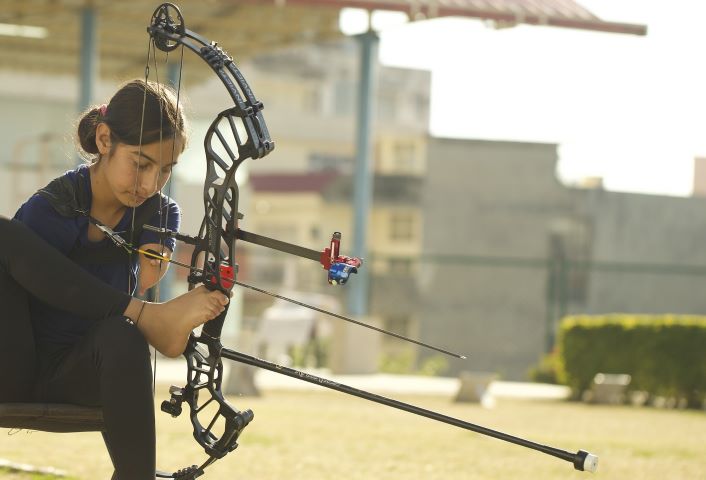At the Tokyo Paralympics 2020, Indian athletes with disabilities showcased their unwavering determination by bringing home 19 medals, including 5 golds, despite facing numerous challenges. Regardless of this impressive achievement, many in India still hold negative views towards people with disabilities, which become a major obstacle for disabled athletes to succeed. These athletes face issues such as limited resources, lack of access to equipment and skilled trainers, and societal stigma.
Corporate Social Responsibility (CSR) can play a vital role in addressing these challenges and supporting disabled athletes in reaching their full potential. Taking a step in this direction The Baker's Dozen (TBD) has launched the ‘Keep Moving’ initiative to support young talent from rural India, starting with para-athlete Sheetal Devi.
Chasing the dreams
Sheetal Devi is India’s youngest female state-level archer, who hails from one of the remotest villages in Jammu & Kashmir. Despite being born without hands, she has excelled in archery, using her toes instead. Her determination and perseverance have earned her numerous awards and her physical challenge has become a source of strength. Aditi Handa, Co-founder of TBD, was impressed by Sheetal's unwavering determination not to let her physical disability hold her back. She competes with those without disabilities and serves as an inspiration to not limit oneself based on perceived limitations. Aditi feels it's important to share Sheetal's story and inspire others to adopt a similar level of determination and resilience in their own lives. 
TBD is sponsoring Sheetal as she aims to become a champion for India. For the next 2 years, the company will support Sheetal's overall development through contributions to her basic needs like food, housing, and education. The brand also plans to spread Sheetal's inspiring story through their products and invite her to their head office to inspire employees and engage in various baking activities. The goal of the initiative is to inspire the youth, reframe people's views on disabilities, and highlight the contributions of differently-abled individuals. Aditi comments that the association with Sheetal is the first step towards telling more stories of resilience and perseverance.
How CSR can take a step forward?
One of the primary ways in which CSR can help sportspersons with disabilities is by providing financial support for equipment and training. Many disabled sportspersons struggle to access the right equipment and facilities to train and compete at a high level. The high cost of such equipment and the lack of funds from the government can be a major hindrance to their participation.
Therefore, by sponsoring these athletes, companies can help to provide them with the necessary resources to participate in their chosen sport. This not only helps to level the playing field but also helps to foster a more inclusive society, where everyone has an equal opportunity to pursue their passions.
According to Aditi, one of the biggest challenges they face is acquiring proper equipment and finding a qualified coach, as the cost of such equipment can be prohibitively high, and government funding is often limited. She suggests that to support these talented athletes and help them achieve their dreams, it is crucial for companies and brands to step forward and provide financial support, even small donations can have a significant impact and provide motivation.
This move by TBD will also significantly change the mindsets of brands who usually invest in athletes once they have achieved a certain level of recognition like an award or a medal for the country. According to the company the ideal thing to do would be to support and encourage them during their journey so that more athletes can make India proud at the national and international levels.
“As an individual or a company, I believe that when making a charitable contribution, it is not necessary to constantly evaluate the outcomes. From an entrepreneurial perspective, it is important to aid those in need when it is required, as it is one of the simplest ways to give back to the community. In our country, there are many talented individuals who are unable to reach their full potential due to lack of financial and social support. This often results in them giving up on their sports careers, which is a loss for both them and the society,” she adds. According to her even small donations by brands/companies can make a big difference and motivate them.
In addition to financial support, CSR can also provide a platform for these athletes to showcase their talents. By organizing sports events and competitions specifically for people with disabilities, companies can give these athletes an opportunity to showcase their skills and talent to the world. This not only helps to raise awareness of their abilities but also helps to create a supportive community where these athletes can find inspiration and encouragement. Some companies that have a history of supporting sports and disabilities initiatives in India through their CSR funds include Tata Group, Reliance Industries, Aditya Birla Group, and Mahindra Group.
Furthermore, the Indian government, too, has launched several initiatives and programs to support and encourage disabled sportspersons in the country. These include the National Institute of Sports for Persons with Disabilities, a facility dedicated to training and coaching disabled athletes. Additionally, the government's Disability Sports India program encourages sports participation and promotes the talents of disabled individuals. The government also provides job opportunities for disabled sportspersons in various departments and organizations. Disabled individuals are also included in National Games and given equal opportunities to participate and display their skills. Corporates should expedite government efforts by providing them with funds especially for the maintenance and upkeep of existing facilities, and providing customised equipment and infrastructure as per the needs of the differently abled sports community.
However, real progress can only be made by raising awareness and sensitizing stakeholders to the needs of differently abled sportspersons. The lack of opportunities for disabled sportspersons to compete has become a major challenge because many sports organizations do not have inclusive policies or do not have the facilities to accommodate people with disabilities.
To improve this situation, corporates investing in sports can help to create a more inclusive society, where people with disabilities are accepted and valued for their contributions. By partnering with organizations and initiatives that support sportspersons with disabilities, companies can help to promote their cause and raise awareness of the challenges that these athletes face. This not only helps to break down barriers but also helps to create a more inclusive and supportive environment for these athletes. They should also divert funds into the research and development of technological innovations like biomechanics, prosthetics, other surgical and engineering techniques that will result in unprecedented opportunities for these sportspersons.
In conclusion, CSR has a crucial role to play in helping sportspersons with disabilities. By providing financial support, creating platforms for these athletes to showcase their talents, and promoting their cause, companies can help to create a more inclusive and supportive society. By doing so, companies not only make a difference in the lives of athletes like Sheetal Devi, but also contribute to the overall development of the society.








.jpg)






